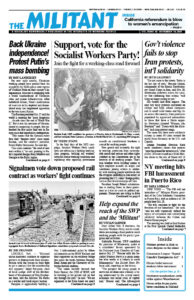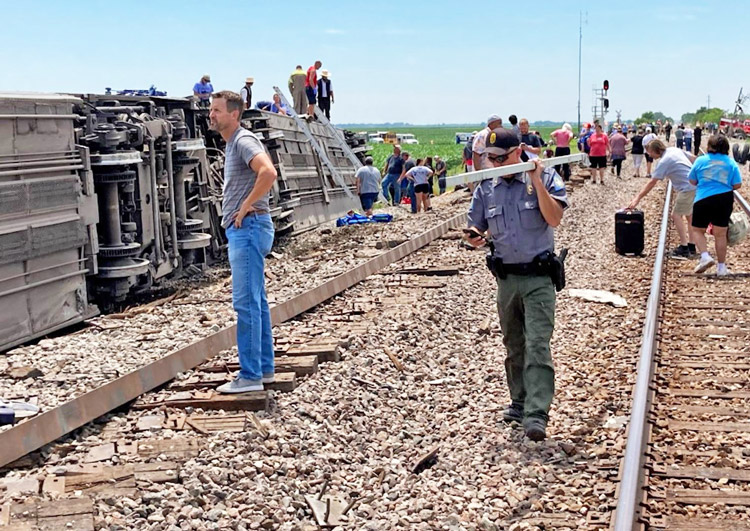LINCOLN, Neb. — “Railroad union members continue to organize protests to demonstrate their dissatisfaction with the bosses in their fight to get a contract that the membership will approve,” Jakob Forsgren, chair of local Lodge 1320 of the Brotherhood of Maintenance of Way Employees here, told the Militant. He works as a welder and track repair worker.
Forsgren is aggressively building a Nov. 2 informational picket by fellow rail unionists on the BNSF Railway and their supporters on the walkway bridge that spans the tracks between Pinnacle Bank Arena and the University of Nebraska football stadium.
“The union recently learned that Katie Farmer, the CEO of BNSF, will be traveling in her private rail car that day through the yard,” he said. “We are organized to let Katie know we aren’t happy with the way we’ve been treated up to this point in negotiations.”
Getting out the facts about what rail workers face is what the action is aimed at. “A lot of fiction is being promoted by the media and the railroad employers,” Forsgren said.
The BMWE is one of 12 rail unions that have been tied up in years of contract negotiations with the five U.S.-based Class 1 railroads and a number of smaller lines. They have been wrapped up in red tape and mandated “cooling off” periods under the anti-labor Railway Labor Act. All of them now face an agreement imposed by a Presidential Emergency Board appointed by Joseph Biden.
More than anything, rail workers have expressed anger and frustration over their lack of paid sick leave, harsh attendance policies with little time off, schedules and working conditions that are onerous and pose the danger of working even when exhausted.
BMWE members voted down the rail bosses’ contract offer Oct. 10.
On Oct. 26, the 6,000-strong Brotherhood of Railroad Signalmen announced that nearly 61% of its members voted down a proposed five-year contract. The two unions represent some 25% of the 115,000 rail workers.
Railroad signalmen members install and maintain high voltage electrical lines, complex telecommunications equipment, and install and maintain the signal network crucial for safe movement of trains. These signals and road crossing warning devices are life and death questions for conductors, locomotive engineers and working people who live and work near the tracks.
Both the freight railroads and the government board “failed to recognize the safety-sensitive and highly stressful job BRS members perform,” union President Michael Baldwin said after the vote. “Without signalmen, the roadways and railroad crossings would be unsafe for the traveling public.”
The White House responded. “As the president has said for months, any shutdown would be completely unacceptable,” Biden’s press secretary, Karine Jean-Pierre, said.
Rail bosses, shipping associations and capitalist media are warning that a rail shutdown is increasingly possible, which demonstrates once again the potential power of rail workers. With industry and agribusiness dependent on the railroads and many profit-driven factory bosses operating on just-in-time inventories, a shutdown of the rail system for even a short duration would have a big impact on the economic life of the country. The boss class wants the White House and Congress to be ready to intervene on its behalf.
A coalition of 322 business associations sent a letter to Biden Oct. 27 demanding he take whatever steps are necessary to prevent a strike. All 12 rail unions must approve their agreements to prevent a strike later this month. Six smaller unions have approved the agreements to date.
Dockworkers pledge support
Bosses across the country are also worried about the possibility of a West Coast longshoremen’s strike. Dockworkers there have been embroiled in extended negotiations since May with the Pacific Maritime Association — a bloc of port bosses and seagoing shippers — and are getting increasingly angry over lack of an acceptable settlement.
For the first time, more goods are being shipped from East Coast ports than those on the west, as bosses nationwide look to avoid the impact of a possible strike.
In mid-September the 22,000-member International Longshore and Warehouse Union, which organizes the docks, spoke out in favor of the rail workers’ fight.
ILWU officials described what rail workers live with. “No weekends, no holidays, getting fired for getting sick or attending funerals, three worker fatalities in 10 days. No one should be forced to accept intolerable working conditions in 2022,” ILWU International President Willie Adams said.
“The ILWU supports the workers who are standing up not only for their own working conditions, but against the erosion of rights for all workers nationwide,” Bobby Olvera Jr., the union’s vice president, added.
The two largest rail unions — the Sheet Metal, Air, Rail and Transportation Workers — Transportation Division (SMART-TD) and the Brotherhood of Locomotive Engineers and Trainmen, who together represent over 60,000 conductors and locomotive engineers — say they mailed out ballots on proposed contracts Oct. 31 and will announce the results of the votes Nov. 21. The presidents of the two unions have been touring the country, explaining the vote is in your hands but the agreement might be the best you can get.
The Nov. 21 announcements will come two days after the BMWE “cooling-off” period” ends.
A major concern for many conductors and engineers is language in the tentative agreements that would allow the carriers to expand use of “automated bid scheduling” and “self-supporting pools.” These are systems for scheduling work, already in place in some areas, that workers explain help bosses intensify pressure for them to be available for work all of the time. Most conductors and engineers are on call now 24/7.
Debate on the contract proposals — and actions like the Lincoln protest Nov. 2 — show that regardless of how the votes turn out, rail workers intend to continue to find ways to fight to defend themselves.
Naomi Craine, a SMART-TD conductor in Chicago, contributed to this article.


